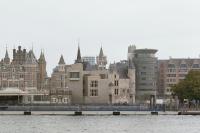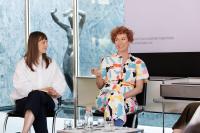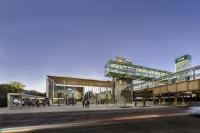Lecture room building
Barcelona, Spain
This project illustrates how we coordinated the programmatic needs of the client in a highly valuable architectural context. Within a diverse community, the project encompassed all the ranges of socialization: from very open in public space to purely academic activities in the seminar rooms. The project was extremely successful and well-received within the community and what was intended as a temporary building for the university has been preserved as part of the patrimony of the campus.
1. A proposal that is integrated into a highly protected architectural context. The new volume is placed in a way that highlights the best views of the preserved existing building. The use of light material reduces its impact and creates a careful calibration between the old brick facade and the new envelope. In the interior, for the rehabilitation and reuse of the existing basement, we combined white and red wood pieces that were shaped using a CNC system to allow for diverse patterns to emerge, while creating transparencies that increase the acoustic performance of the space.
2. A proposal that supports open social interaction. In the exterior space, the proposal organizes a social space for students and the community to meet. We designed a prefabricated piece that can be reorganized in different layouts and is capable of resolving all the topographic differences. To increase the relationship with the surrounding streets, we avoided fencing that would block and separate; instead, we designed a system that allows for maximum transparency and mediated views toward the interior.
3. A sustainable design using every available means. For this project, we used a prefabricated system; the new building was built off site and then transferred and assembled on site. This construction logic allowed us to keep the highest control of qualities, timing and costs, and reduced the impact of construction disturbances in the neighborhood. The selection of the main materials (such as the recycled polycarbonate used for the facade) was intended to fulfill maximum sustainable criteria. The use of very light construction also helped reduce the impact of the foundations. The arrangement of all the exterior ground and green area is designed to optimize water collection, which is currently used as part of the building systems.
- Architetti
- SiO2 Arch
- Sede
- Carrer de Ramon Turró, 08005 Barcelona, Spain
- Anno
- 2008













